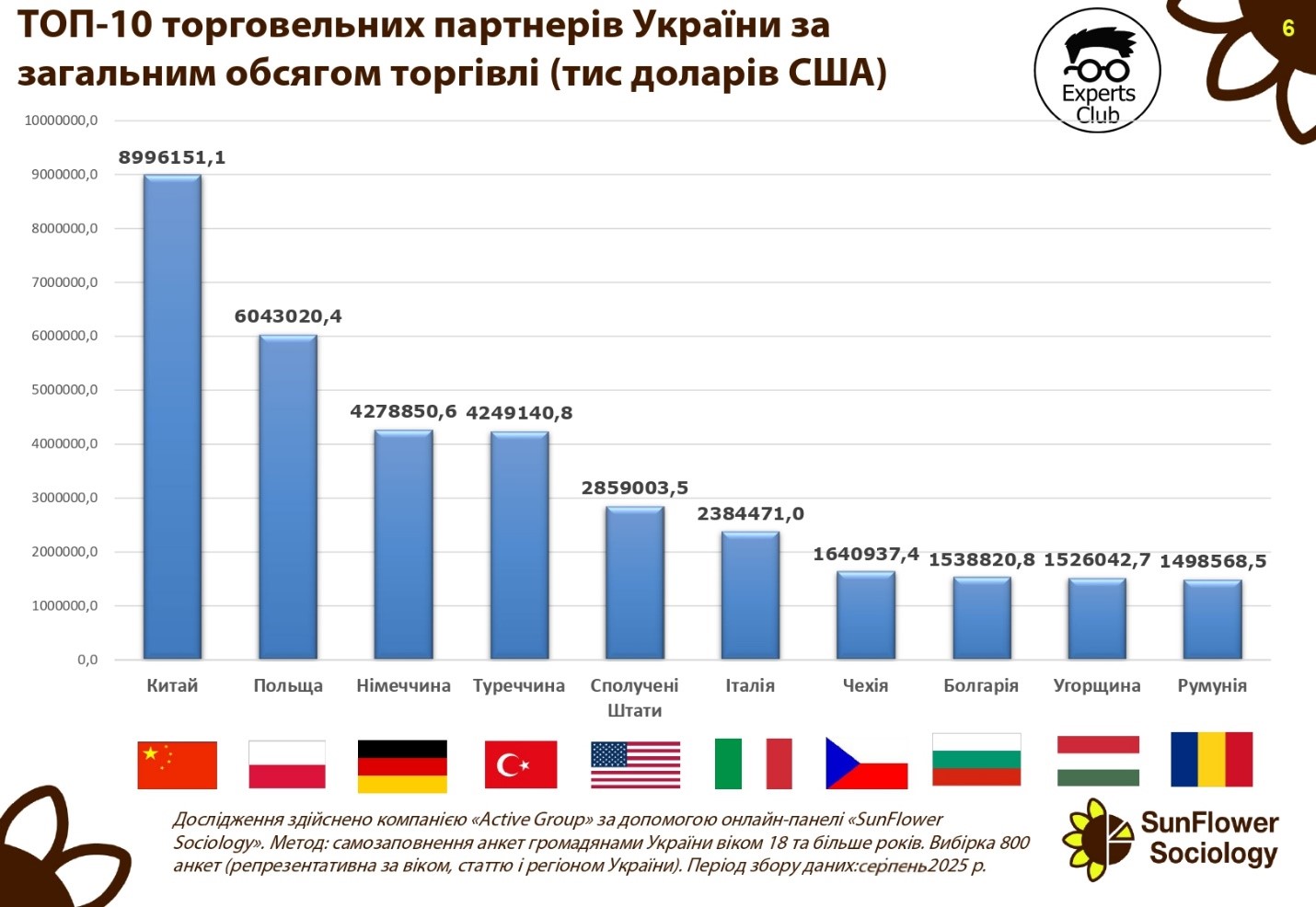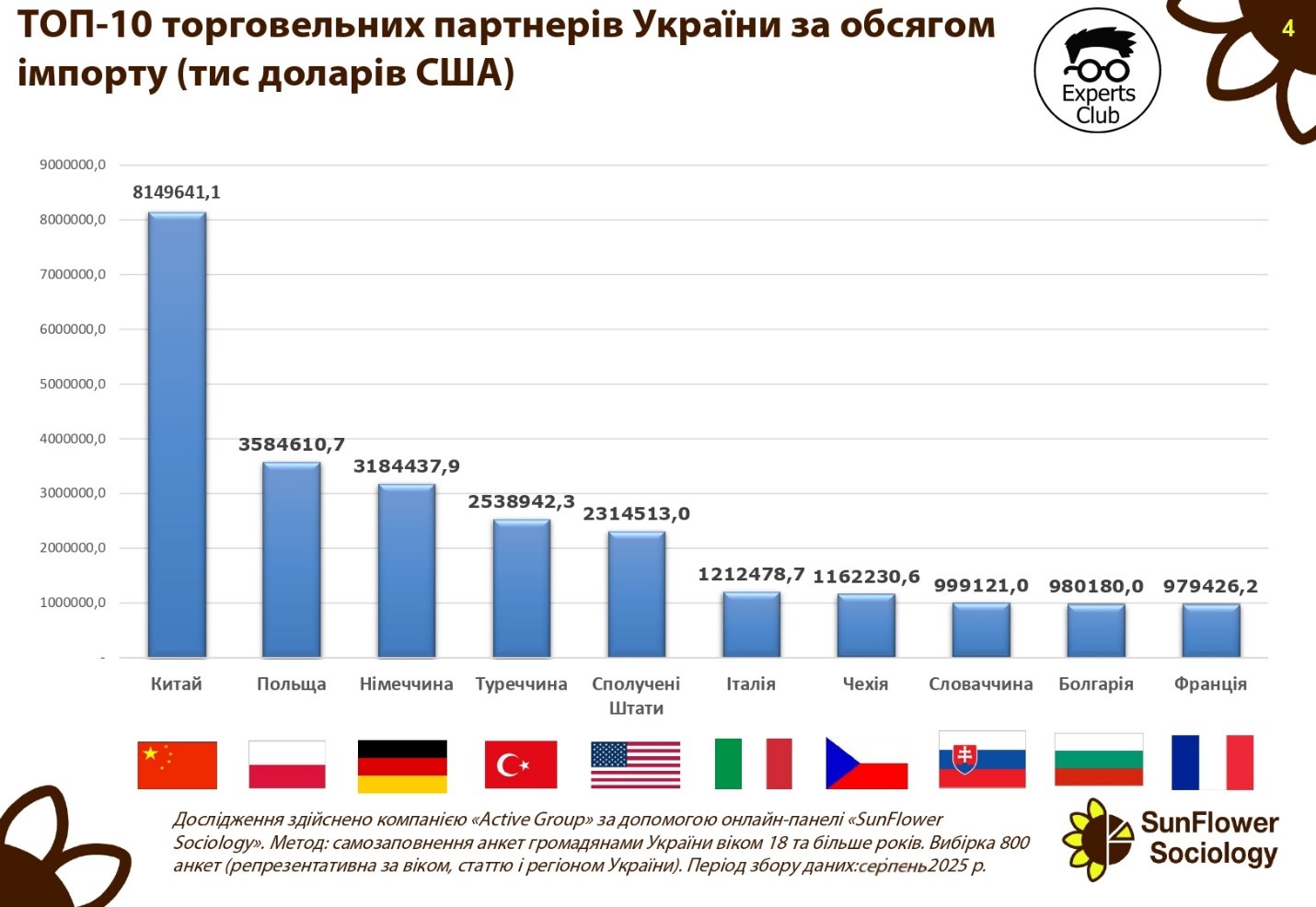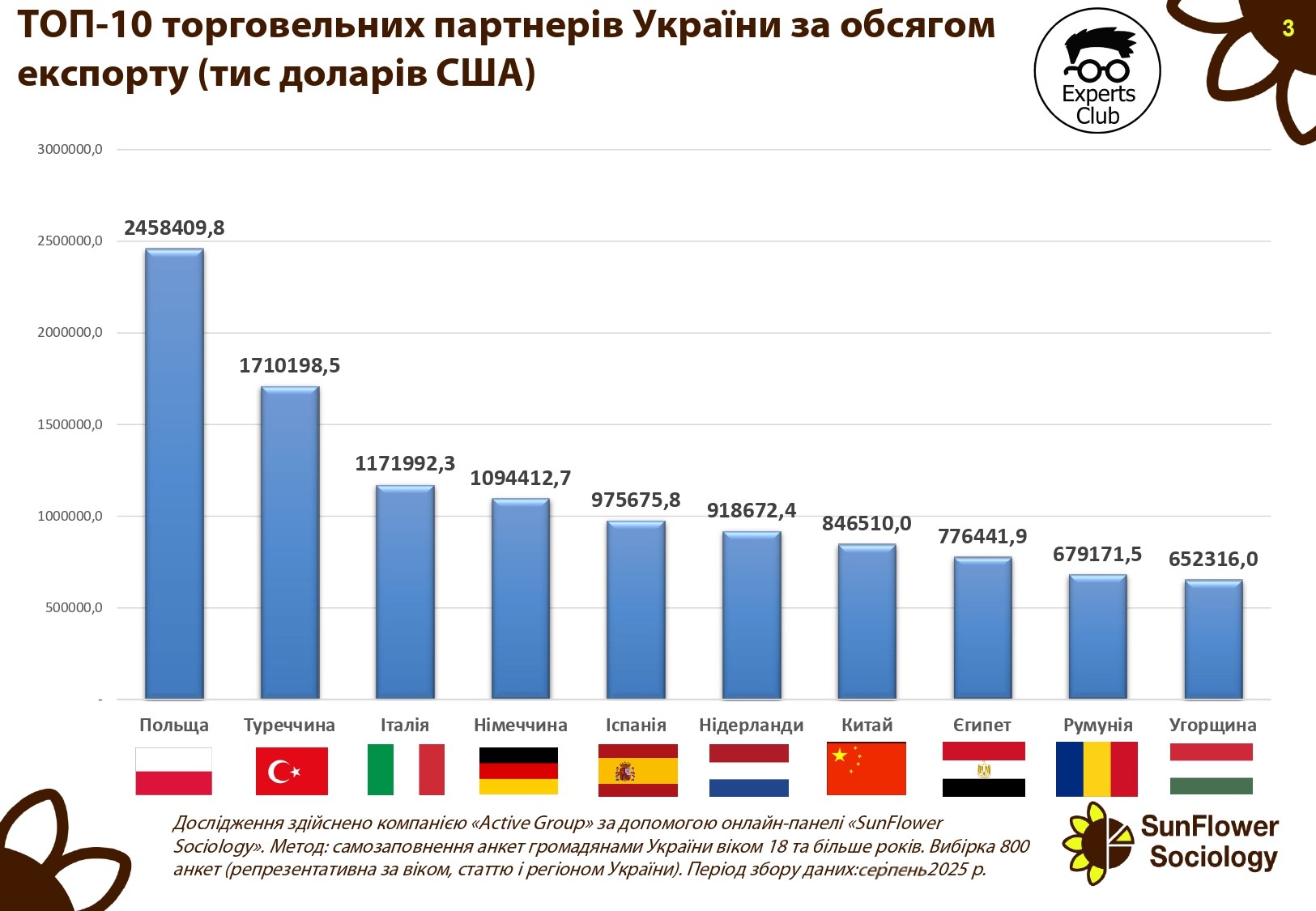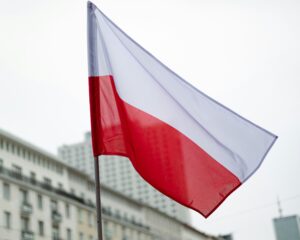
In terms of total trade volume, Ukraine cooperates most closely with China, Poland, and Germany. These countries form the basis of the state’s foreign economic relations, exerting a critical influence on imports and exports.
China remains the leader with a total trade volume of $8.99 billion. Poland ranks second with $6.04 billion, while Germany and Turkey are almost equal with $4.28 billion and $4.25 billion, respectively. The United States ranks fifth with $2.86 billion.

The top 10 also includes Italy ($2.38 billion), the Czech Republic ($1.64 billion), Bulgaria ($1.54 billion), Hungary ($1.53 billion), and Romania ($1.50 billion).
“The top ten partners form the basis of Ukraine’s foreign trade balance. China and the EU countries account for the largest volumes of trade, but it is important to take into account the significant negative balance in relations with these countries,” said Maksim Urakin, founder of Experts Club and economist.
He added that although the large volume of trade indicates Ukraine’s integration into global supply chains, dependence on imports from China and Europe creates strategic risks.
“Poland and Germany are key hubs for Ukrainian exports, but at the same time they are significant sources of imports. Therefore, it is critically important to balance trade flows, preserving positive sectors such as agriculture and metallurgy, and reducing dependence on critical imports,” Urakin noted.
BULGARIA, CHINA, CZECH REPUBLIC, ECONOMY, EXPERTS CLUB, FOREIGN TRADE, GERMANY, HUNGARY, ITALY, POLAND, ROMANIA, TURKEY, UKRAINE, USA, МАКСИМ УРАКИН

China remains the undisputed leader among Ukraine’s trading partners in terms of import volume. In the first six months of 2025, Ukraine imported Chinese goods worth US$8.15 billion. This is more than twice the figures for Poland ($3.58 billion) and Germany ($3.18 billion), which ranked second and third, respectively.
High import volumes were also recorded from Turkey ($2.53 billion) and the United States ($2.31 billion). Italy, the Czech Republic, Slovakia, Bulgaria, and France round out the top ten key suppliers with volumes ranging from $1.2 billion to $979 million.

“The formation of such an import structure indicates Ukraine’s excessive dependence on Chinese goods, especially in the electronics, technology, and industrial products segments. Such an imbalance poses risks to economic stability, as any political or logistical restrictions will immediately affect the domestic market,” emphasized Maksim Urakin, founder of Experts Club and economist.
At the same time, experts point to the diversification of supplies from European Union countries. Poland, Germany, Italy, and France together account for more than $8.5 billion in imports, forming a significant segment of the domestic consumer and industrial market.
Economists predict that, provided the hryvnia exchange rate remains stable and import flows continue at current levels, the trade deficit with China will continue to grow. This will require an adjustment of state trade policy towards stimulating domestic production and searching for alternative markets.
ACTIVE GROUP, CHINA, ECONOMY, EU, EXPERTS CLUB, GERMANY, IMPORTS, POLAND, SunFlower Sociology, TRADE BALANCE, TURKEY, UKRAINE, USA, МАКСИМ УРАКИН

According to the results of the first half of 2025, Poland remains Ukraine’s main trading partner in terms of export volumes. According to research by Active Group and Experts Club, exports to Poland amounted to US$2.45 billion.
Turkey ranks second with USD 1.71 billion, and Italy ranks third with USD 1.17 billion. Other major partners include: Germany ($1.09 billion), Spain ($976 million), the Netherlands ($919 million), China ($847 million), Egypt ($776 million), Romania ($679 million), and Hungary ($652 million).

“The structure of Ukraine’s exports shows a clear focus on European Union countries. Poland, Italy, Germany, Spain, and the Netherlands together account for more than half of total exports. This indicates Ukraine’s strategic integration into the European economic space,” emphasized Maksim Urakin, founder of Experts Club and economist.
He also noted that Turkey remains a critically important partner for Ukrainian agricultural and metallurgical exports, while China and Egypt are key markets for agricultural products, particularly grains.
“The presence of trading partners such as Egypt and China diversifies Ukrainian exports,” Urakin added.
CHINA, ECONOMY, EGYPT, EXPERTS CLUB, EXPORTS, GERMANY, HUNGARY, ITALY, POLAND, ROMANIA, TRADE, TURKEY, UKRAINE, МАКСИМ УРАКИН


Poland remains one of the most positively perceived countries by Ukrainians, despite some controversies in bilateral relations. This is evidenced by the results of an all-Ukrainian survey conducted by Active Group in cooperation with the Experts Club information and analytical center in August 2025.
According to the survey, 56.7% of Ukrainian citizens have a positive attitude towards Poland (44.3% – mostly positive, 12.3% – completely positive). Only 12.7% of respondents expressed a negative attitude (11.3% – mostly negative, 1.3% – completely negative). Another 30.0% of Ukrainians are neutral, and 1.0% said they are not sufficiently aware of this country.

“For Ukrainians, Poland is not only a neighbor, but also one of their key economic partners. In the first half of 2025, total trade between Ukraine and Poland exceeded $6.66 billion. At the same time, exports from Ukraine amounted to $3.03 billion, and imports from Poland exceeded $3.62 billion. The negative balance of $591 million does not seem critical, given the scale and strategic nature of cooperation,” said Maksym Urakin, founder of Experts Club.
In turn, co-founder of Active Group Oleksandr Poznyi emphasized that the positive attitude of Ukrainians towards Poland has deeper reasons than just the economy.
“We are talking about historical proximity, support for Ukrainian refugees, and Warsaw’s political solidarity in important international issues. At the same time, the economic dimension only strengthens these relations, making Poland one of Ukraine’s leading partners both in the EU and globally. It is the combination of political, humanitarian and economic components that explains the high level of sympathy in society,” he added.
The survey was part of a broader study of international sympathies and antipathies of Ukrainians in the current geopolitical context.
The full video can be viewed here:
https://www.youtube.com/watch?v=YgC9TPnMoMI&t
You can subscribe to the Experts Club YouTube channel here:
https://www.youtube.com/@ExpertsClub
ACTIVE GROUP, DIPLOMACY, EXPERTS CLUB, POLAND, Posniy, SOCIOLOGY, TRADE, URAKIN

The Polish Sejm has passed a law introducing new conditions for foreigners, including Ukrainian citizens, to receive the “Rodzina 800+” child benefit. The law links the payment of benefits to the mandatory employment of parents, as well as to children attending Polish schools. businessinsider.com.pl+2rmf24.pl+2
A foreigner will be entitled to the “800+” benefit only if they were employed in Poland in the previous month. If the parent was not working, the benefit will be suspended. A mandatory condition is that the children of foreigners must attend Polish schools. Foreigners must earn at least 50% of the minimum wage in Poland. In 2025, this is approximately PLN 2,333 gross.
The document must now be signed by Polish President Karol Nawrocki to enter into force. The temporary protection period for Ukrainians has also been extended until March 4, 2026.
According to a report by the Union of Polish Metropolises, in May 2025, approximately 3.37-3.85 million Ukrainians were living in Poland, many of whom had arrived since the start of the war in 2022. According to another source, about 1.55 million Ukrainian citizens live in Poland with documents, with different statuses (temporary residence, work, etc.).
There is also an estimate that before the war and before the active phase of migration began, there were about 1.35 million Ukrainians who were there legally as migrant workers and others.

Consulting firm Deloitte has released the 14th edition of its Property Index 2025 report on European housing markets. The study covers 28 countries. Ukraine was not included in this study.
The highest average mortgage rates are in Hungary (9.35%), Poland (7.67%), and Romania (6.89%). Deloitte
The lowest are in Bulgaria (2.83%), Croatia (2.86%), and Turkey (3.01%).
The average rate in Europe is 4.36%, which is slightly lower than last year and reflects the gradual easing of monetary policy in a number of countries.
Deloitte notes that against the backdrop of a “bottleneck” with new projects and sustained demand, the rental segment is strengthening (rates are rising not only in capital cities but also in regional centers). At the same time, high rates and regulatory lags in permits continue to put pressure on property affordability, especially in large agglomerations.
Deloitte Property Index 2025 — a comparative study of European housing markets: prices for new buildings, affordability (in years of gross salary for a 70 m² apartment), rental dynamics, and mortgage rates. Key findings and figures are available on the Deloitte Property Index 2025 report page.